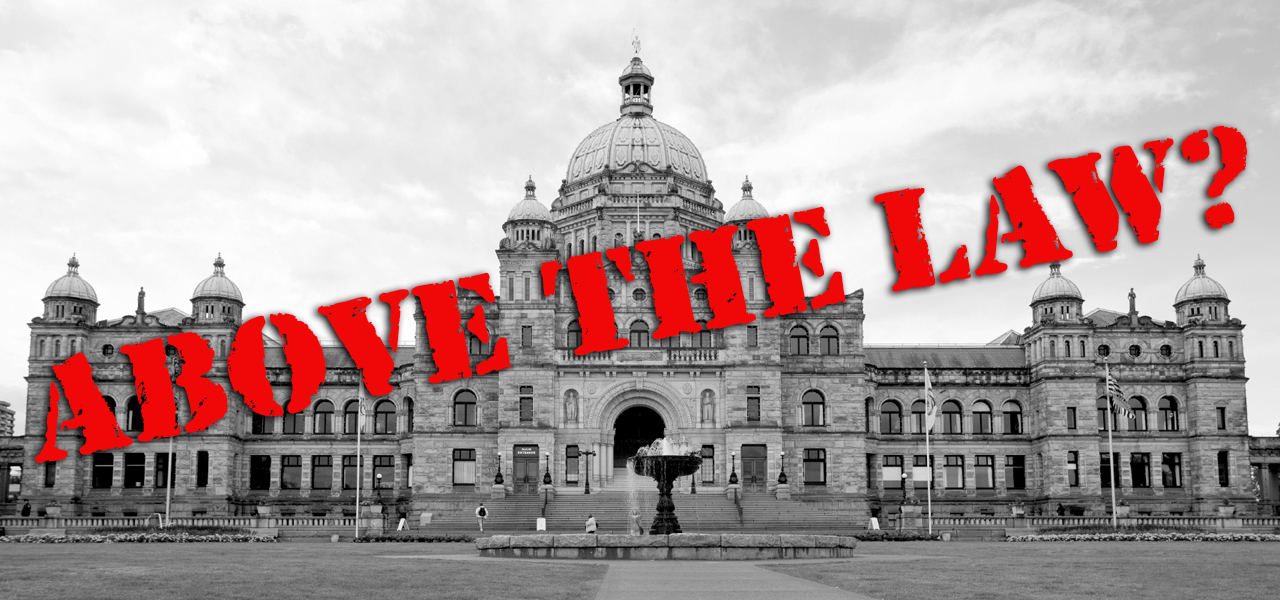BC government: climate leader or climate outlaw?

At both the Paris climate negotiations last November and the recent federal-provincial climate meetings, Premier Christy Clark was keen to position British Columbia as a climate leader.
There may indeed have been a short window during the 2008-2010 period when BC could legitimately (albeit arguably) make such a claim; when the province introduced the carbon tax and passed legislated greenhouse gas (GHG) reduction targets. But now it’s 2016, and BC is not a climate leader – it’s a climate outlaw.
The BC government cannot claim it’s a climate leader when:
- It has done nothing to advance climate action for five years. Christy Clark has held the carbon tax frozen at a mere $30/tonne since she became premier. And no major new climate initiatives have been launched in that time.
- GHG emissions have been going up each year since 2011. As Marc Lee has outlined, GHG emissions fell in 2009 and 2010 when the carbon tax was first introduced (although mainly due to the recession), but have increased each year since. Between 2011 and 2013, BC emissions grew by 1.5 megatonnes – the equivalent of adding 400,000 cars to the province’s roads. Meanwhile, other provinces like Ontario and Quebec are seeing their emissions go down.
- The latest BC Budget seems to presume that GHG emissions will continue to go up for the next three years. Even though the tax itself remains frozen at $30/tonne, the budget forecasts a 1.6% annual growth in carbon tax revenues for the next three years, meaning the government expects more carbon pollution and thus higher carbon tax revenues.
- The government’s central economic agenda revolves around fracking unconventional natural gas from the Northeast and converting it into liquefied natural gas. As both Marc Lee and I have argued here and here, pursuit of LNG has the potential to represent a new Canadian “carbon bomb” that, like the oil sands, does deep harm to both national GHG emission reduction targets and global climate goals. We at the CCPA have been saying since before the last BC election that the province’s natural gas strategy and legislated GHG reduction targets are fundamentally incompatible. Simply put, in pursuing LNG, the province is breaking its own law.
- On March 21, Christy Clark put a former climate skeptic, Fazil Mihlar, in charge of heading up the province’s climate plans. Mihlar, who is now promoted to deputy minister, used to be a senior researcher and director with the Fraser Institute, which has long published pieces denying human–induced climate change and argues against climate action. Later, as an editorial page editor with the Vancouver Sun, he wrote pieces bemoaning efforts to stop fossil fuel development (as you can see here and here. And his first stint in government was as assistant deputy minister to Rich Coleman, helping to advance the province’s LNG plans. An odd choice, to put it mildly, to oversee the province’s climate action plan.
The premier herself now readily admits that the government will not meet its own legislated GHG-reduction target for 2020, making it a climate outlaw.
Leadership doesn’t mean doing nothing while waiting for others to catch up; it should mean forging ahead on a new path. Post-Paris, we are obliged to figure out how to do our part to keep global temperature increase to 1.5 degrees. In practice, that means we’ve got to get our BC emissions down to zero by mid-century. Real leadership is a moral imperative, and will be economically rewarded as well, if we get out ahead of the curve. Major investments in energy efficiency and transit infrastructure can save us all money down the road.
Of course as we enter an election year, the official opposition will also be obliged to spell out its plans – what will it do differently about LNG, transit, energy, the carbon tax, etc.?
Wouldn’t it be great to see a race for who can rightly claim the mantle of real climate leadership?
Topics: Climate change & energy policy, Environment, resources & sustainability, Fracking & LNG


